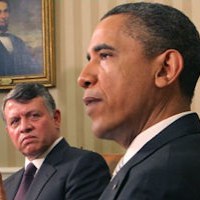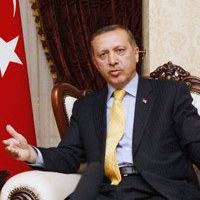![]()
Thu, October 10, 2013 | RubinReports | By Barry Rubin

Libyan Prime Minister Ali Zeidan kidnapped at gunpoint and held at an unidentified location, but released after several hours. (Photo: Reuters)
Thursday’s brief kidnapping of Libyan Prime Minister Ali Zeidan is another turning point in the Middle East, a warning signal to every Arab country looking to have relations with the United States.
The Libyan government was overthrown by a U.S.-led alliance which intended to bring democracy to Libya. However, Libya has since suffered anarchy and terrorism, including the killing of an American ambassador and three other U.S. officials last September 11, 2012. In other words, the ouster of Muammar Gaddafi — the only “successful” Middle Eastern initiative of the Obama administration — has been shown to be a house of cards.
This new incident is a response to a recent U.S. raid on Libya that captured an al-Qaeda terrorist who was the mastermind in planning several attacks on the United States. Al-Qaeda wanted to make it clear that the United States is no stronger than they in Libya. If America could seize a leading terrorist, then al-Qaeda could seize the prime minister.
Perhaps with that point being made, al-Qaeda released the prime minister hours later. But consider what was proven: the United States can’t protect an ally, no matter how high-level he is. No doubt Karzai, the president of Afghanistan, has taken note regarding the future with the Taliban.
Speaking of Karzai:
“‘Meanwhile, serious new irritants in the relationship have convinced Karzai that he was right to question American good faith in year-old negotiations on an idea,” wrote the Washington Post. “The accord is considered critical for the international community to continue funding the Afghan government and shoring up its nascent security forces.”
“In the previously unreported incident, U.S. forces intercepted an Afghan government convoy and seized the leader in Logar province, Karzai spokesman Aimal Faizi said. In doing so, Faizi added, the Americans foiled a months-long bid by the Afghan government to wean the Taliban commander, identified by others as Latif Mehsud, from the battlefield and use him to help launch substantive peace talks.
“Faizi called the seizure a major breach of sovereignty. Although Karzai has not mentioned the case publicly, his private fury has been reflected in recent suggestions that Afghanistan might forgo a bilateral pact.”
Meanwhile, a U.S. raid targeting Somalia failed to capture a leading al-Qaeda terrorist, and of course al-Qaeda is an “ally” in Syria, being on the side the United States is supporting. And the United States is punishing Egypt as it fights an insurgency by al-Qaeda and other terrorist groups, a move intended to help the Muslim Brotherhood. (It should be noted that the purpose of the Muslim Brotherhood’s sponsorship by the U.S. government is to fight al-Qaeda. But there’s not a single example of the Muslim Brotherhood or Salafists combating al-Qaeda, except possibly one or two in Iraq.)
Watch this Egyptian activist lose his cool about the Muslim Brotherhood. Notice that while the U.S. government is of course on the side of the MB, Israel is of course on the side of the army, yet this irrational insane hatred of Israel is so clear, too. For a statement by a ‘Kuwait scholar that he views antisemitism as an integral part of Islam, see here.
What this all means is that the United States is weak and not an attractive ally.
And twelve years after the September 11 attacks, and after Obama’s recent declaration that it is defeated, al-Qaeda is still able to act.
Barry Rubin is director of the Global Research in International Affairs (GLORIA) Center and editor of the Middle East Review of International Affairs (MERIA) Journal. His next book, “Nazis, Islamists and the Making of the Modern Middle East,” written with Wolfgang G. Schwanitz, will be published by Yale University Press in January 2014. His latest book is “Israel: An Introduction,” also published by Yale. Thirteen of his books can be read and downloaded for free at the website of the GLORIA Center including “The Arab States and the Palestine Conflict,” “The Long War for Freedom: The Arab Struggle for Democracy in the Middle East” and “The Truth About Syria.” His blog is Rubin Reports. His original articles are published at PJMedia.



 RSS
RSS










Latest Comments
Hello Mike, Thank you for your positive feedback to the article. I felt there wasn’t too much critical analysis of ...
Thanks for this considered and well constructed article. A follow up article on the manner in which the editorial contro...
THE CLUELESSNESS OF CLAIMING THAT OBAMA'S MIDDLE EAST POLICIES WERE A FAILURE CANNOT BE FURTHER FROM THE TRUTH, WHAT THE...
As long as Obama is the president of the usa do not trust the us government......
Thank you for an good read....